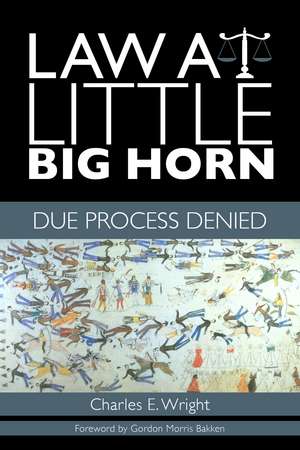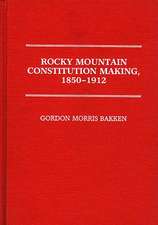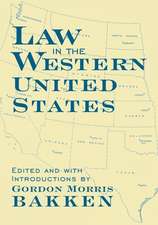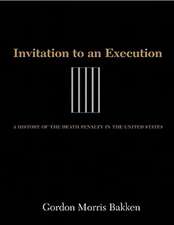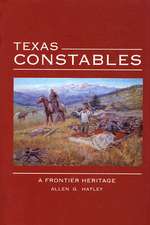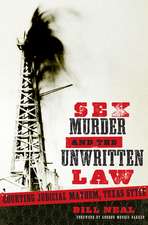Law at Little Big Horn: Due Process Denied: Plains Histories
Autor Charles E. Wright Cuvânt înainte de Gordon Morris Bakkenen Limba Engleză Hardback – 14 ian 2016
During the nineteenth century, the rights of American Indians were frequently violated by the president and ignored or denied enforcement by federal courts. However, at times Congress treated the Indians with good faith and honored due process, which prohibits the government from robbing any person of life, liberty, or property without a fair hearing before an impartial judge or jury. These due process requirements protect all Americans and were in effect when President Grant launched the Great Sioux War in 1876—without a formal declaration of war by Congress.
Charles E. Wright analyzes the legal backdrop to the Great Sioux War, asking the hard questions of how treaties were to be honored and how the US government failed to abide by its sovereign word. Until now, little attention has been focused on how the events leading up to and during the Battle of Little Big Horn violated American law. While other authors have analyzed George Armstrong Custer’s tactics and equipment, Wright is the first to investigate the legal and constitutional issues surrounding the United States’ campaign against the American Indians.
This is not just another Custer book. Its contents will surprise even the most accomplished Little Big Horn scholar.
Charles E. Wright analyzes the legal backdrop to the Great Sioux War, asking the hard questions of how treaties were to be honored and how the US government failed to abide by its sovereign word. Until now, little attention has been focused on how the events leading up to and during the Battle of Little Big Horn violated American law. While other authors have analyzed George Armstrong Custer’s tactics and equipment, Wright is the first to investigate the legal and constitutional issues surrounding the United States’ campaign against the American Indians.
This is not just another Custer book. Its contents will surprise even the most accomplished Little Big Horn scholar.
Din seria Plains Histories
-
 Preț: 141.04 lei
Preț: 141.04 lei -
 Preț: 261.98 lei
Preț: 261.98 lei -
 Preț: 122.07 lei
Preț: 122.07 lei -
 Preț: 172.17 lei
Preț: 172.17 lei -
 Preț: 235.56 lei
Preț: 235.56 lei -
 Preț: 145.99 lei
Preț: 145.99 lei -
 Preț: 256.02 lei
Preț: 256.02 lei -
 Preț: 216.41 lei
Preț: 216.41 lei -
 Preț: 200.16 lei
Preț: 200.16 lei -
 Preț: 225.21 lei
Preț: 225.21 lei -
 Preț: 134.86 lei
Preț: 134.86 lei -
 Preț: 262.16 lei
Preț: 262.16 lei -
 Preț: 196.63 lei
Preț: 196.63 lei -
 Preț: 224.34 lei
Preț: 224.34 lei -
 Preț: 224.14 lei
Preț: 224.14 lei -
 Preț: 223.03 lei
Preț: 223.03 lei -
 Preț: 138.99 lei
Preț: 138.99 lei -
 Preț: 254.94 lei
Preț: 254.94 lei -
 Preț: 285.31 lei
Preț: 285.31 lei - 20%
 Preț: 187.67 lei
Preț: 187.67 lei
Preț: 265.91 lei
Nou
Puncte Express: 399
Preț estimativ în valută:
50.88€ • 53.27$ • 42.10£
50.88€ • 53.27$ • 42.10£
Carte disponibilă
Livrare economică 15-29 martie
Preluare comenzi: 021 569.72.76
Specificații
ISBN-13: 9780896729124
ISBN-10: 0896729125
Pagini: 352
Dimensiuni: 152 x 229 x 30 mm
Greutate: 0.68 kg
Ediția:1
Editura: Texas Tech University Press
Colecția Texas Tech University Press
Seria Plains Histories
ISBN-10: 0896729125
Pagini: 352
Dimensiuni: 152 x 229 x 30 mm
Greutate: 0.68 kg
Ediția:1
Editura: Texas Tech University Press
Colecția Texas Tech University Press
Seria Plains Histories
Recenzii
With passion and clarity, Wright shows that Indian policy, especially that of the late nineteenth century, was not built on the bedrock of law that is the Fifth Amendment of the Constitution. Law at Little Big Horn is a thoroughly researched and powerfully presented work of history that merits a place in your bookshelf and warrants study of serious scholars and casual history buffs alike.
—Charles E. Trimble, past executive director of the National Congress of American Indians and principal founder of the American Indian Press Association
—Charles E. Trimble, past executive director of the National Congress of American Indians and principal founder of the American Indian Press Association
Notă biografică
Born and raised in western Nebraska, Charles E. Wright is a retired lawyer who spent fifty years practicing in Nebraska and Colorado. He has long been associated with Indian rights and has funded scholarships and organized a mentoring program for promising Indian students from recognized tribes to attend law school.
